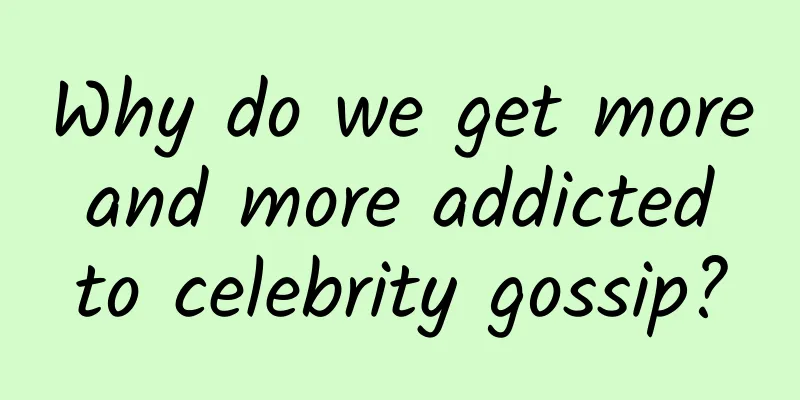Why do we get more and more addicted to celebrity gossip?

|
At the beginning of the new year, eye-catching "big melons" have frequently appeared on the Internet, and many netizens have joked that they are "like the civet jumping up and down in the melon field." Why are we so keen on "eating melons"? What does "eating melons" bring us? Why does eating melons make people addicted? Why do people get addicted to "eating melons"? Because "eating melons" comes from two instinctive needs of human beings, one is the instinct to collect, and the other is the instinct to form a group. The so-called "eating melons" is gossiping in a down-to-earth way, curiosity in a popular way, and thirst for knowledge in a more elegant way. Eating melons, eating melons, here "melons" refer to a kind of information. However, if "eating melons" is simply to obtain or exchange some information, then you may be chewing the melon skin, not the sweetest core of the melon. Because "eating melons" also has two focuses, one is "what kind of melon", and the other is "how to eat it". 1. Collecting instinct: Why is it easy to get addicted to “eating melons”? Dopamine is the reason why we feel happy, and it is also the strongest helper for "eating melons". The main reason why "eating melons" is associated with dopamine is the collection instinct inherited from our ancestors. Our prehistoric ancestors not only had to collect materials, but also information. Living in an era when there was nothing to be found and wild beasts roamed everywhere, even the smallest piece of information could cost a group of people their lives. Based on the need for survival, our ancestors' brains developed an early warning system and reward system with dopamine as the core. The brain secretes dopamine to drive us to "explore surrounding information." If it is "important information," more dopamine will be secreted to "reward" us for obtaining more information. This kind of "important information" also includes gossip. Gossip is not only idle talk, but also a social security system. Humans are social creatures. In order to live safely in a community where people gather, one needs to ensure that people treat each other sincerely and help each other, rather than cheating and harming each other. Copyright images in the gallery. Reprinting and using them may lead to copyright disputes. Multiple studies have found that humans spend an average of 80% of their waking time in the company of others. We spend an average of 6 to 12 hours a day talking to others, and 80 to 90% of the content is related to a specific person. This is not because we have nothing to do, but to ensure the quality of life through information exchange. To some extent, gossip information itself is a signal of survival, which shows the importance of "social information" to survival. Rumors and gossip not only allow people to gain physiological pleasure from the secretion of dopamine, but also allow them to identify "threats" and "important people", and know who holds the same values as themselves, who is untrustworthy, and who to stay away from. This indirectly helps us establish a community's moral standards of behavior, thereby ensuring the stability of the community and our own lives. Therefore, gossip, especially things that violate morality, are most irritating to those of us who think "life is a bit dull and needs a little excitement." 2. Group instinct: Humans prefer to eat melons together The famous psychologist Steven Pinker pointed out: "Knowledge is power." When some important information is "I know it but you don't", we gain control over things and others. Of course, if you just say "I know" but don't tell the other party, you can't exert your control. As the saying goes, happiness is better shared than happiness alone, and happiness is better shared than eating alone. Eating "melons" together is the sweetest. Even in prehistoric times, "gossip" was the main content of our ancestors' daily communication because it involved the sharing of key life-saving information: "Hey, kid, don't touch that beautiful, hissing strip. The Neanderthal kid next door was bitten to death by this hissing strip yesterday" or "Wow, the Neanderthal guy next door bit off my little brother's arm. Let's migrate together with the Denisovans" and so on. Copyright images in the gallery. Reprinting and using them may lead to copyright disputes. If you don't share what you see and hear with B, you won't be able to let B know that C is unreliable, and you won't be able to convince B to team up with you to fight monsters, so the information you collected will be useless. Our ancestors have long seen the reality that the survival rate of fighting alone is much lower than that of working in a team. Therefore, natural evolution has written the need for belonging into our genes, and sticking together is actually to meet our need for belonging. So, when someone wants to "eat melons together" with you, it is actually an invitation to you: let's stick together! Why is “eating celebrity melons” more addictive? Sometimes, gossip about stars and famous people is more exciting than reading a wonderful novel. 1. “Celebrity melons” save us a lot of imagination When reading a novel, the image and characteristics of the characters require the reader to use his imagination and outline an outline based on the author's description, but it is just an outline. The protagonist in the mind seems to be covered with a thick layer of gauze, hazy and a little ethereal. The big gossips about celebrities provide an anchor point for gossipers. What does the protagonist look like? How tall is he? Does he have a nice voice? What is his dressing style? These questions are very clear. We don’t need to waste extra brainpower to imagine. We just need to click on the page with the mouse and follow the text description to play a vivid and exciting blockbuster in our minds. 2. “Celebrity melons” do not require any previous information and are safe Stars and celebrities are our common "friends". You know them, I know them, and people in the same circle know them. When communicating "big melon", we can save a lot of background introductions and foreshadowing. All we need is a simple "Hey, did you hear about that person who broke the news yesterday?" to get straight to the point, exchange information, start discussions, and express opinions. We no longer need to be cautious and sneaky, nor do we need to worry about being discovered by the protagonist or being accused of being a "gossip" by others. We can speak with confidence and boldly because it is safe. 3. “Celebrity gossip” helps us achieve a balance between self and mind The world of fame and fortune in which celebrities live is glamorous and extravagant, which is difficult for ordinary people like us to touch, but the pervasive online media allows us to spy on their every move and life every day. This forces us to watch them "build tall buildings" and "entertain guests" every day, but we are not one of them. When we compare ourselves with people who are not as good as us in some aspect, it will enhance our self-satisfaction and improve our self-worth; however, when we compare ourselves with people who are better than us in some aspect, which social psychologists call upward social comparison, our satisfaction with ourselves and life will be greatly reduced, and our sense of happiness will plummet. Copyright images in the gallery. Reprinting and using them may lead to copyright disputes. Therefore, the happiness we feel when seeing a celebrity’s building collapse, although mixed with a bit of gloating, is not because we are not morally noble enough or do not have strong empathy. It is more about finding a balance between ourselves and our mind: “Look, although I am not as handsome as him and make much less money than him, I am loyal to you and will not commit domestic violence!” This allows us to still hold on to the hope that "when God closes this door, he will definitely open a window for you", and continue to work peacefully and live a down-to-earth life. 4. “Celebrity gossip” broadens the emotional dimension and enriches life experience Watching the "big melon" of celebrities is like watching a story, a movie, or a novel. In following the ups and downs of the "melon", we are also able to take on one of the characters, experience the emotional development and mental journey of the protagonist, and gain inspiration from the protagonist's experience, allowing us to see: What would it be like if you encountered a similar situation? What consequences would result from taking similar actions? How should you deal with similar difficulties? We can experience the things that we want to avoid and fear in real life, and also experience vicariously the things that we have always been curious about but have not completed or cannot complete due to various realities and reasons. This indirectly broadens our horizons without paying a price, broadens our emotional dimension, enriches our life experience, and helps us avoid a lot of "trial and error costs." This may be the reason why "PDF Melon" makes people more addicted to it, because the degree of completeness and details disclosed are comparable to novels, and it guarantees "non-fiction" to a certain extent, which makes people vaguely feel a sense of connection, "Maybe my aunt's friend's son's classmates know the protagonist of the melon", bringing some excitement to reality and some truth to the excitement. In short, as social animals, we are born to gossip. Whether we like it or not, and whether we don't want to admit it or not, humans are the descendants of nosy people. When we "eat melons", we are not simply watching the fun or laughing, but examining our own lives, relationships, attitudes and beliefs; and when we "eat melons" with others, we are not simply exchanging information or gossiping, but satisfying the need for belonging while also establishing moral standards for ourselves and others. Therefore, the "melon-eating crowd" is not watching the fun, but life. References [1]Dunbar, R., 1998. Grooming, Gossip, and the Evolution of Language. Harvard University Press, Cambridge, Mass. [2]McAndrew,FT,ndGossipisasocialskill–notacharacterflaw[WWWDocument].TheConversation.URLGossipisasocialskill(accessed9.26.16). [3] Ding Qian, Zhang Yongxin, Zhou Zongkui. Social networking site use and jealousy: The mediating role of upward social comparison and the moderating role of self-esteem. (2017), Psychological Science, 40 (3), 618-624. [4] Lisa Kron. (2022). Writing Brain Science. Beijing: Machinery Industry Press. [5] Daniel Lieberman and Michael E. Lang (2021). Greedy Dopamine. Beijing: CITIC Press [6] Michael Gazzaniga. (2016). The Glory of Humanity: What Makes Us Unique. Beijing: Beijing United Publishing Company. This article is a work of Science Popularization China-Starry Sky Project Produced by: Science Popularization Department of China Association for Science and Technology Producer|China Science and Technology Press Co., Ltd., Beijing Zhongke Xinghe Culture Media Co., Ltd. Author: Su Jing, National Level 2 Psychological Counselor Reviewer: Fan Chunlei, Associate Researcher, Institute of Psychology, Chinese Academy of Sciences |
>>: Interstellar Odyssey: A Guide to the Solar System's Planets in 2024
Recommend
How to attract traffic to Toutiao today? Violent traffic diversion methods for headlines
When it comes to traffic, we naturally think of D...
How to make users addicted to your product? These 4 steps are required
What would happen if users fell in love with prod...
The embarrassment of Google’s smart hardware: bad luck, or a cycle of fate?
Do you still remember Google Glass ? This smart h...
Big data tells you what the elderly are busy with when they go online?
This era does not only belong to young people. In...
Will the lake on the "Roof of the World" expand by 50%? More water is not necessarily a good thing...|Expo Daily
Lakes on the Qinghai-Tibet Plateau are expected t...
One formula and five indicators help you build data analysis thinking as a product manager!
Question: For improving the data analysis capabil...
How to operate the Pinduoduo mini program for growth!
Since its very beginning in e-commerce user growt...
Turning off the lights and looking at your phone can be very harmful! Get rid of this habit now...
Expert of this article: Xu Qibin, associate chief...
How to promote user conversion? 99% of them used this trick~
Today, I want to share with you a trick to promot...
One is an anteater that eats termites, and the other is an army ant that eats everything. Which one is stronger?
Termites, a type of winged insect that can effici...
Don't eat too much pre-made egg liquid, but the problem is not the 20 food additives...
“Why use semi-finished products when two eggs and...
A mad scientist who ate 720 eggs in one month had a surprising ending.
Eggs are synonymous with nutrition. They are eate...
Exclusive interview with APICloud CTO Zou Da: A full-stack engineer forced out
[[137215]] In the era of mobile Internet, APP is ...
Myocardial infarction is more common in autumn and winter, so don’t take it lightly!
Myocardial infarction is a serious cardiovascular...









